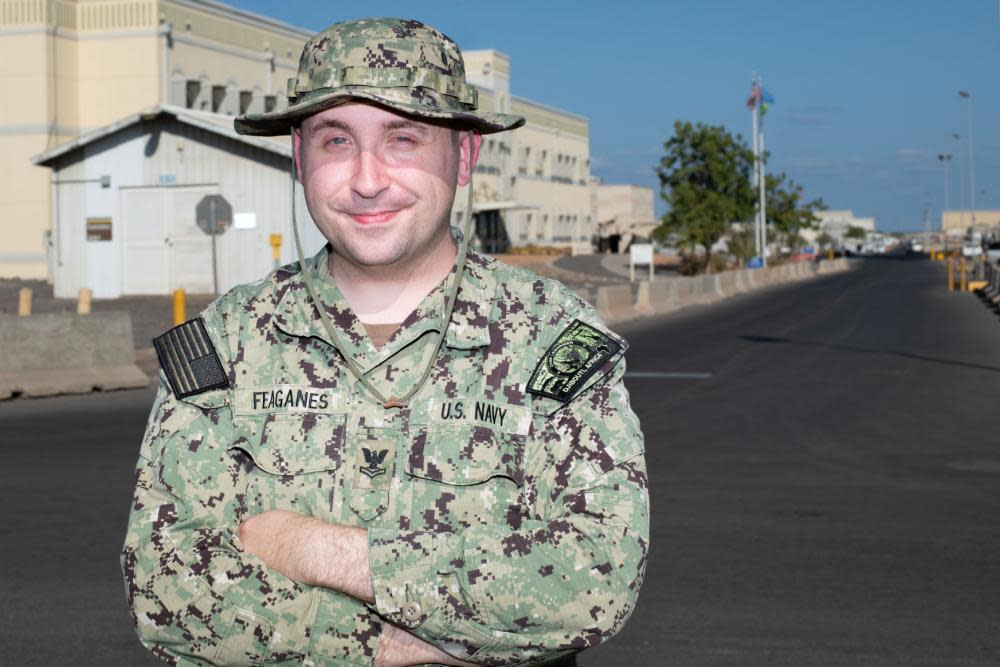From Monroe to Africa / Navy Yeoman Feaganes doesn't miss the snow

CAMP LEMONNIER, Djibouti – What does it take to oversee the day-to-day operations of the only permanent U.S. military base on the entire African continent? Strong, experienced leadership is at the forefront of any military operation, but they cannot do it alone.
To ensure our military leaders operate at peak efficiency, they need to focus on the mission and have their working days planned down to the minute. At Camp Lemonnier, Djibouti (CLDJ), the commanding officer, the executive officer, and the command master chief need Yeoman 2nd Class John Feaganes.
“I am the executive assistant to the triad,” says Feaganes, a Navy Reserve Sailor from Monroe, who drills at Navy Operational Support Center Battle Creek. “It’s a daily task making sure their schedules are good-to-go. Anyone who needs to see them— needs to come to me first.”
Yeoman is one of the oldest jobs in the Navy, dating all the way back to 1794. When you think of the modern Navy, you might picture SEAL teams performing special operations or aircraft taking off from the flight deck of a carrier. What many people may not realize is none of that is possible without the dedication of a strong administrative team.
“We are the oil in the machine, keeping our Sailors optimized,” says Yeoman Chief Robert McFarlane, the leading chief petty officer of the Camp Lemonnier N1 administration department and Feaganes’s immediate supervisor. “Sailors are important to the Navy. Making sure that Sailors are taken care of in every aspect is important to their peak performance. YN2 has excelled at his job and is a good teammate. He goes above and beyond.”
Tending to the administrative needs and schedules of some of the most important leaders of CLDJ could be a full-time job alone, but Feaganes also takes on many other tasks such as writing official correspondences, processing awards, and filing evaluations for his fellow deployed Sailors. Feaganes has also managed to volunteer time with the E5 association on base, and he has taken on the monumental task of enrolling in and taking the first class of a master’s degree college education program.
“It made for very long days (taking these classes),” recalls Feaganes. “I would come in at three in the morning and try to get reading time before the day had started and I usually would not leave until 1700 or 1800. I haven’t gotten my final grade back yet, but the last time I checked it should be an 86%. That’s not too bad for your first class in a master’s program, especially while being on deployment!”
Feaganes says he joined the Navy, not only to help pay for school, but to push himself to do something more with his life and to get out of his comfort zone. He has interacted with people he otherwise never would have met. He has seen the world through different viewpoints and learned new ways of doing things. This is his first deployment, and he believes being in Djibouti has prepared him for the next journey of his life.
“I’m from Monroe, Michigan,” says Feaganes. “If anyone knows Michigan weather, they know it’s not always the best. I’m kind of glad I am here, and I don’t have to deal with the snow this year. I want to move to Texas. It’s going to be another adventure to go down there. If I can bear the heat here, I don’t think it would be too bad there.”
Sailors like YN2 John Feaganes have major responsibilities, but they are also willing to take on the quiet tasks. They do the jobs that might go unnoticed until it’s not getting done. They complete the behind-the-scenes jobs like picking up the mail, servicing the department vehicles or picking up lunch for the commanding officer when he’s in a meeting with a high-level dignitary. Without Sailors like him, our Navy could not operate as smoothly or efficiently. Sailors like YN2 keep our Navy always mission-ready.
“I help Sailors progress through their career in the Navy,” explains Feaganes. “And to me, that is very rewarding.”
Camp Lemonnier, Djibouti serves as an expeditionary base for U.S. military forces providing support to ships, aircraft and personnel that ensure security throughout Europe, Africa and Southwest Asia. The base enables maritime and combat operations in the Horn of Africa while fostering positive U.S.-Africa relations.
Petty Officer 2nd Class Jonathan Word wrote this for the Navy Office of Community Outreach, which sent it to The Monroe News.
This article originally appeared on The Monroe News: From Monroe to Africa / Navy Yeoman Feaganes doesn't miss the snow

